Directives and Direct Effect Student
VerifiedAdded on 2022/09/08
|8
|1927
|75
AI Summary
Contribute Materials
Your contribution can guide someone’s learning journey. Share your
documents today.

Student Credentials
UNIVERSITY
DIRECTIVES AND DIRECT
EFFECT
UNIVERSITY
DIRECTIVES AND DIRECT
EFFECT
Secure Best Marks with AI Grader
Need help grading? Try our AI Grader for instant feedback on your assignments.
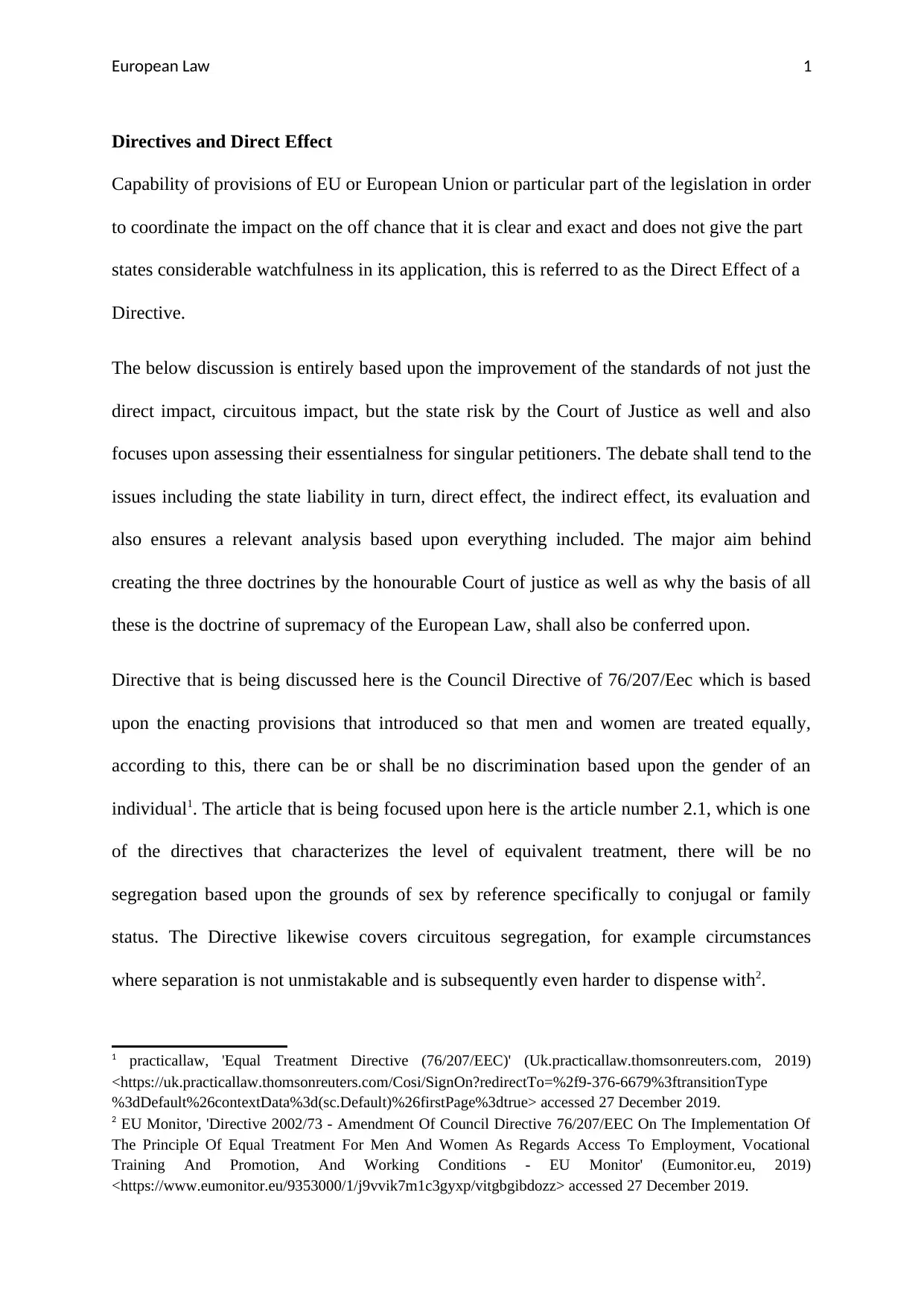
European Law 1
Directives and Direct Effect
Capability of provisions of EU or European Union or particular part of the legislation in order
to coordinate the impact on the off chance that it is clear and exact and does not give the part
states considerable watchfulness in its application, this is referred to as the Direct Effect of a
Directive.
The below discussion is entirely based upon the improvement of the standards of not just the
direct impact, circuitous impact, but the state risk by the Court of Justice as well and also
focuses upon assessing their essentialness for singular petitioners. The debate shall tend to the
issues including the state liability in turn, direct effect, the indirect effect, its evaluation and
also ensures a relevant analysis based upon everything included. The major aim behind
creating the three doctrines by the honourable Court of justice as well as why the basis of all
these is the doctrine of supremacy of the European Law, shall also be conferred upon.
Directive that is being discussed here is the Council Directive of 76/207/Eec which is based
upon the enacting provisions that introduced so that men and women are treated equally,
according to this, there can be or shall be no discrimination based upon the gender of an
individual1. The article that is being focused upon here is the article number 2.1, which is one
of the directives that characterizes the level of equivalent treatment, there will be no
segregation based upon the grounds of sex by reference specifically to conjugal or family
status. The Directive likewise covers circuitous segregation, for example circumstances
where separation is not unmistakable and is subsequently even harder to dispense with2.
1 practicallaw, 'Equal Treatment Directive (76/207/EEC)' (Uk.practicallaw.thomsonreuters.com, 2019)
<https://uk.practicallaw.thomsonreuters.com/Cosi/SignOn?redirectTo=%2f9-376-6679%3ftransitionType
%3dDefault%26contextData%3d(sc.Default)%26firstPage%3dtrue> accessed 27 December 2019.
2 EU Monitor, 'Directive 2002/73 - Amendment Of Council Directive 76/207/EEC On The Implementation Of
The Principle Of Equal Treatment For Men And Women As Regards Access To Employment, Vocational
Training And Promotion, And Working Conditions - EU Monitor' (Eumonitor.eu, 2019)
<https://www.eumonitor.eu/9353000/1/j9vvik7m1c3gyxp/vitgbgibdozz> accessed 27 December 2019.
Directives and Direct Effect
Capability of provisions of EU or European Union or particular part of the legislation in order
to coordinate the impact on the off chance that it is clear and exact and does not give the part
states considerable watchfulness in its application, this is referred to as the Direct Effect of a
Directive.
The below discussion is entirely based upon the improvement of the standards of not just the
direct impact, circuitous impact, but the state risk by the Court of Justice as well and also
focuses upon assessing their essentialness for singular petitioners. The debate shall tend to the
issues including the state liability in turn, direct effect, the indirect effect, its evaluation and
also ensures a relevant analysis based upon everything included. The major aim behind
creating the three doctrines by the honourable Court of justice as well as why the basis of all
these is the doctrine of supremacy of the European Law, shall also be conferred upon.
Directive that is being discussed here is the Council Directive of 76/207/Eec which is based
upon the enacting provisions that introduced so that men and women are treated equally,
according to this, there can be or shall be no discrimination based upon the gender of an
individual1. The article that is being focused upon here is the article number 2.1, which is one
of the directives that characterizes the level of equivalent treatment, there will be no
segregation based upon the grounds of sex by reference specifically to conjugal or family
status. The Directive likewise covers circuitous segregation, for example circumstances
where separation is not unmistakable and is subsequently even harder to dispense with2.
1 practicallaw, 'Equal Treatment Directive (76/207/EEC)' (Uk.practicallaw.thomsonreuters.com, 2019)
<https://uk.practicallaw.thomsonreuters.com/Cosi/SignOn?redirectTo=%2f9-376-6679%3ftransitionType
%3dDefault%26contextData%3d(sc.Default)%26firstPage%3dtrue> accessed 27 December 2019.
2 EU Monitor, 'Directive 2002/73 - Amendment Of Council Directive 76/207/EEC On The Implementation Of
The Principle Of Equal Treatment For Men And Women As Regards Access To Employment, Vocational
Training And Promotion, And Working Conditions - EU Monitor' (Eumonitor.eu, 2019)
<https://www.eumonitor.eu/9353000/1/j9vvik7m1c3gyxp/vitgbgibdozz> accessed 27 December 2019.
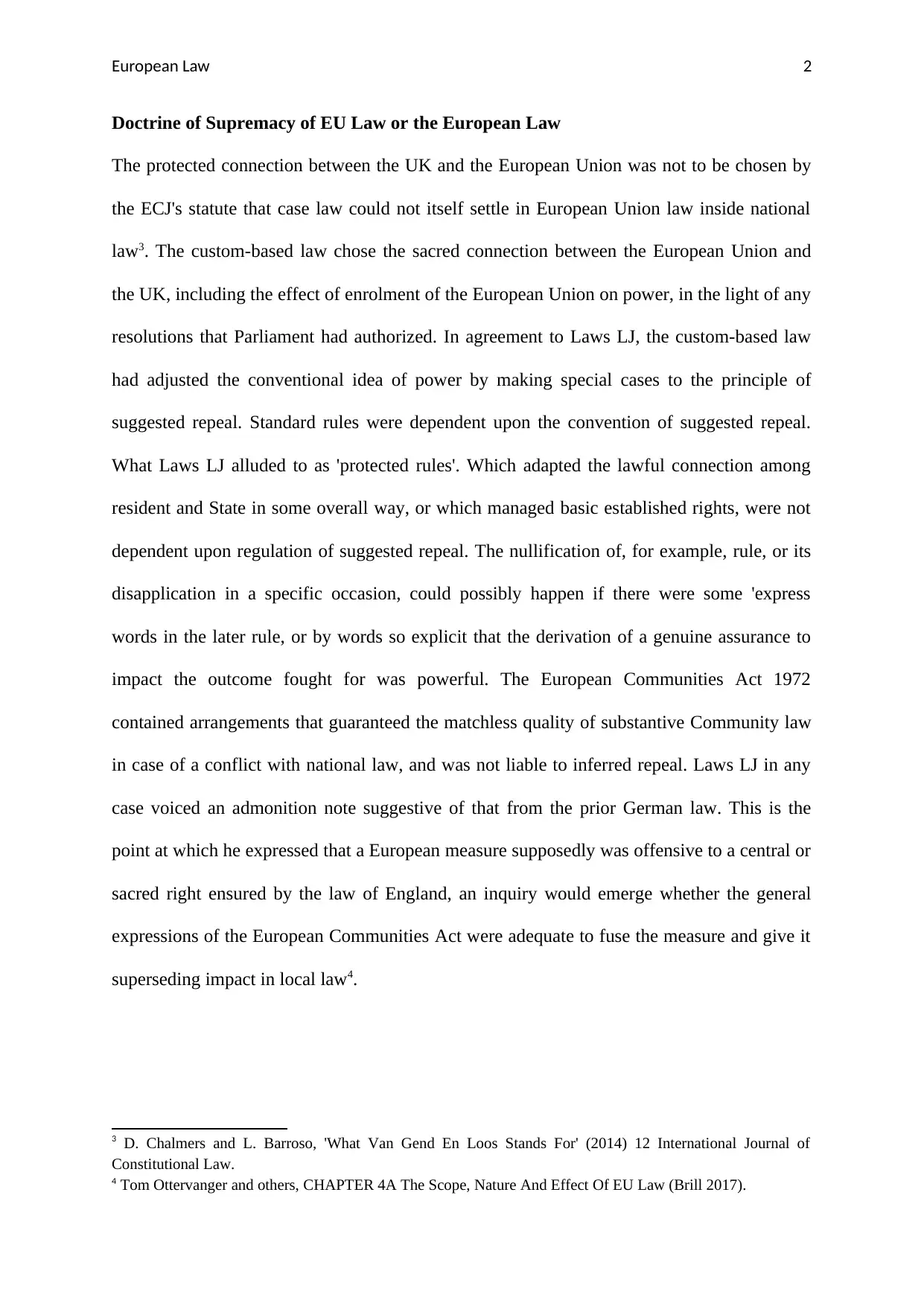
European Law 2
Doctrine of Supremacy of EU Law or the European Law
The protected connection between the UK and the European Union was not to be chosen by
the ECJ's statute that case law could not itself settle in European Union law inside national
law3. The custom-based law chose the sacred connection between the European Union and
the UK, including the effect of enrolment of the European Union on power, in the light of any
resolutions that Parliament had authorized. In agreement to Laws LJ, the custom-based law
had adjusted the conventional idea of power by making special cases to the principle of
suggested repeal. Standard rules were dependent upon the convention of suggested repeal.
What Laws LJ alluded to as 'protected rules'. Which adapted the lawful connection among
resident and State in some overall way, or which managed basic established rights, were not
dependent upon regulation of suggested repeal. The nullification of, for example, rule, or its
disapplication in a specific occasion, could possibly happen if there were some 'express
words in the later rule, or by words so explicit that the derivation of a genuine assurance to
impact the outcome fought for was powerful. The European Communities Act 1972
contained arrangements that guaranteed the matchless quality of substantive Community law
in case of a conflict with national law, and was not liable to inferred repeal. Laws LJ in any
case voiced an admonition note suggestive of that from the prior German law. This is the
point at which he expressed that a European measure supposedly was offensive to a central or
sacred right ensured by the law of England, an inquiry would emerge whether the general
expressions of the European Communities Act were adequate to fuse the measure and give it
superseding impact in local law4.
3 D. Chalmers and L. Barroso, 'What Van Gend En Loos Stands For' (2014) 12 International Journal of
Constitutional Law.
4 Tom Ottervanger and others, CHAPTER 4A The Scope, Nature And Effect Of EU Law (Brill 2017).
Doctrine of Supremacy of EU Law or the European Law
The protected connection between the UK and the European Union was not to be chosen by
the ECJ's statute that case law could not itself settle in European Union law inside national
law3. The custom-based law chose the sacred connection between the European Union and
the UK, including the effect of enrolment of the European Union on power, in the light of any
resolutions that Parliament had authorized. In agreement to Laws LJ, the custom-based law
had adjusted the conventional idea of power by making special cases to the principle of
suggested repeal. Standard rules were dependent upon the convention of suggested repeal.
What Laws LJ alluded to as 'protected rules'. Which adapted the lawful connection among
resident and State in some overall way, or which managed basic established rights, were not
dependent upon regulation of suggested repeal. The nullification of, for example, rule, or its
disapplication in a specific occasion, could possibly happen if there were some 'express
words in the later rule, or by words so explicit that the derivation of a genuine assurance to
impact the outcome fought for was powerful. The European Communities Act 1972
contained arrangements that guaranteed the matchless quality of substantive Community law
in case of a conflict with national law, and was not liable to inferred repeal. Laws LJ in any
case voiced an admonition note suggestive of that from the prior German law. This is the
point at which he expressed that a European measure supposedly was offensive to a central or
sacred right ensured by the law of England, an inquiry would emerge whether the general
expressions of the European Communities Act were adequate to fuse the measure and give it
superseding impact in local law4.
3 D. Chalmers and L. Barroso, 'What Van Gend En Loos Stands For' (2014) 12 International Journal of
Constitutional Law.
4 Tom Ottervanger and others, CHAPTER 4A The Scope, Nature And Effect Of EU Law (Brill 2017).
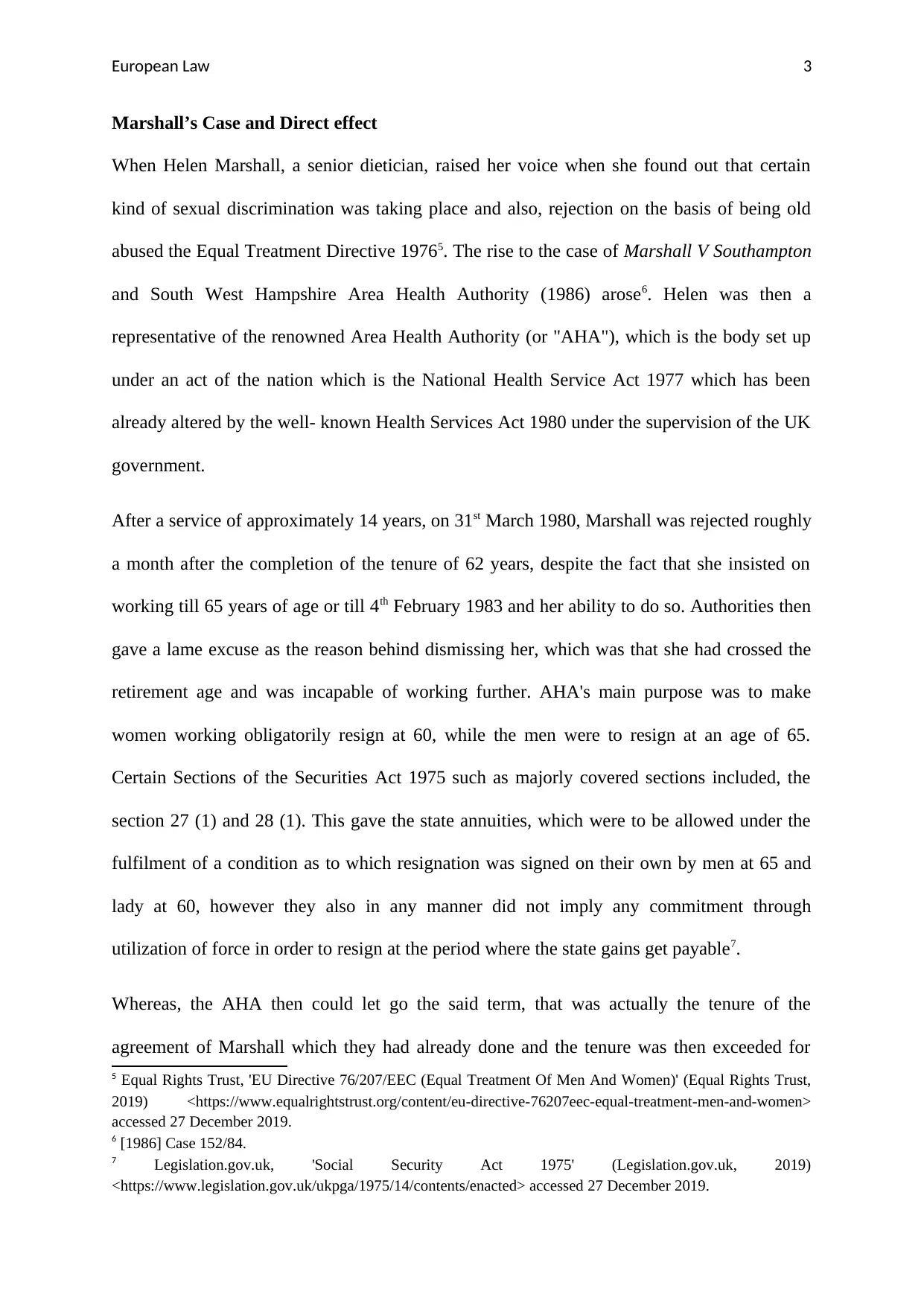
European Law 3
Marshall’s Case and Direct effect
When Helen Marshall, a senior dietician, raised her voice when she found out that certain
kind of sexual discrimination was taking place and also, rejection on the basis of being old
abused the Equal Treatment Directive 19765. The rise to the case of Marshall V Southampton
and South West Hampshire Area Health Authority (1986) arose6. Helen was then a
representative of the renowned Area Health Authority (or "AHA"), which is the body set up
under an act of the nation which is the National Health Service Act 1977 which has been
already altered by the well- known Health Services Act 1980 under the supervision of the UK
government.
After a service of approximately 14 years, on 31st March 1980, Marshall was rejected roughly
a month after the completion of the tenure of 62 years, despite the fact that she insisted on
working till 65 years of age or till 4th February 1983 and her ability to do so. Authorities then
gave a lame excuse as the reason behind dismissing her, which was that she had crossed the
retirement age and was incapable of working further. AHA's main purpose was to make
women working obligatorily resign at 60, while the men were to resign at an age of 65.
Certain Sections of the Securities Act 1975 such as majorly covered sections included, the
section 27 (1) and 28 (1). This gave the state annuities, which were to be allowed under the
fulfilment of a condition as to which resignation was signed on their own by men at 65 and
lady at 60, however they also in any manner did not imply any commitment through
utilization of force in order to resign at the period where the state gains get payable7.
Whereas, the AHA then could let go the said term, that was actually the tenure of the
agreement of Marshall which they had already done and the tenure was then exceeded for
5 Equal Rights Trust, 'EU Directive 76/207/EEC (Equal Treatment Of Men And Women)' (Equal Rights Trust,
2019) <https://www.equalrightstrust.org/content/eu-directive-76207eec-equal-treatment-men-and-women>
accessed 27 December 2019.
6 [1986] Case 152/84.
7 Legislation.gov.uk, 'Social Security Act 1975' (Legislation.gov.uk, 2019)
<https://www.legislation.gov.uk/ukpga/1975/14/contents/enacted> accessed 27 December 2019.
Marshall’s Case and Direct effect
When Helen Marshall, a senior dietician, raised her voice when she found out that certain
kind of sexual discrimination was taking place and also, rejection on the basis of being old
abused the Equal Treatment Directive 19765. The rise to the case of Marshall V Southampton
and South West Hampshire Area Health Authority (1986) arose6. Helen was then a
representative of the renowned Area Health Authority (or "AHA"), which is the body set up
under an act of the nation which is the National Health Service Act 1977 which has been
already altered by the well- known Health Services Act 1980 under the supervision of the UK
government.
After a service of approximately 14 years, on 31st March 1980, Marshall was rejected roughly
a month after the completion of the tenure of 62 years, despite the fact that she insisted on
working till 65 years of age or till 4th February 1983 and her ability to do so. Authorities then
gave a lame excuse as the reason behind dismissing her, which was that she had crossed the
retirement age and was incapable of working further. AHA's main purpose was to make
women working obligatorily resign at 60, while the men were to resign at an age of 65.
Certain Sections of the Securities Act 1975 such as majorly covered sections included, the
section 27 (1) and 28 (1). This gave the state annuities, which were to be allowed under the
fulfilment of a condition as to which resignation was signed on their own by men at 65 and
lady at 60, however they also in any manner did not imply any commitment through
utilization of force in order to resign at the period where the state gains get payable7.
Whereas, the AHA then could let go the said term, that was actually the tenure of the
agreement of Marshall which they had already done and the tenure was then exceeded for
5 Equal Rights Trust, 'EU Directive 76/207/EEC (Equal Treatment Of Men And Women)' (Equal Rights Trust,
2019) <https://www.equalrightstrust.org/content/eu-directive-76207eec-equal-treatment-men-and-women>
accessed 27 December 2019.
6 [1986] Case 152/84.
7 Legislation.gov.uk, 'Social Security Act 1975' (Legislation.gov.uk, 2019)
<https://www.legislation.gov.uk/ukpga/1975/14/contents/enacted> accessed 27 December 2019.
Secure Best Marks with AI Grader
Need help grading? Try our AI Grader for instant feedback on your assignments.
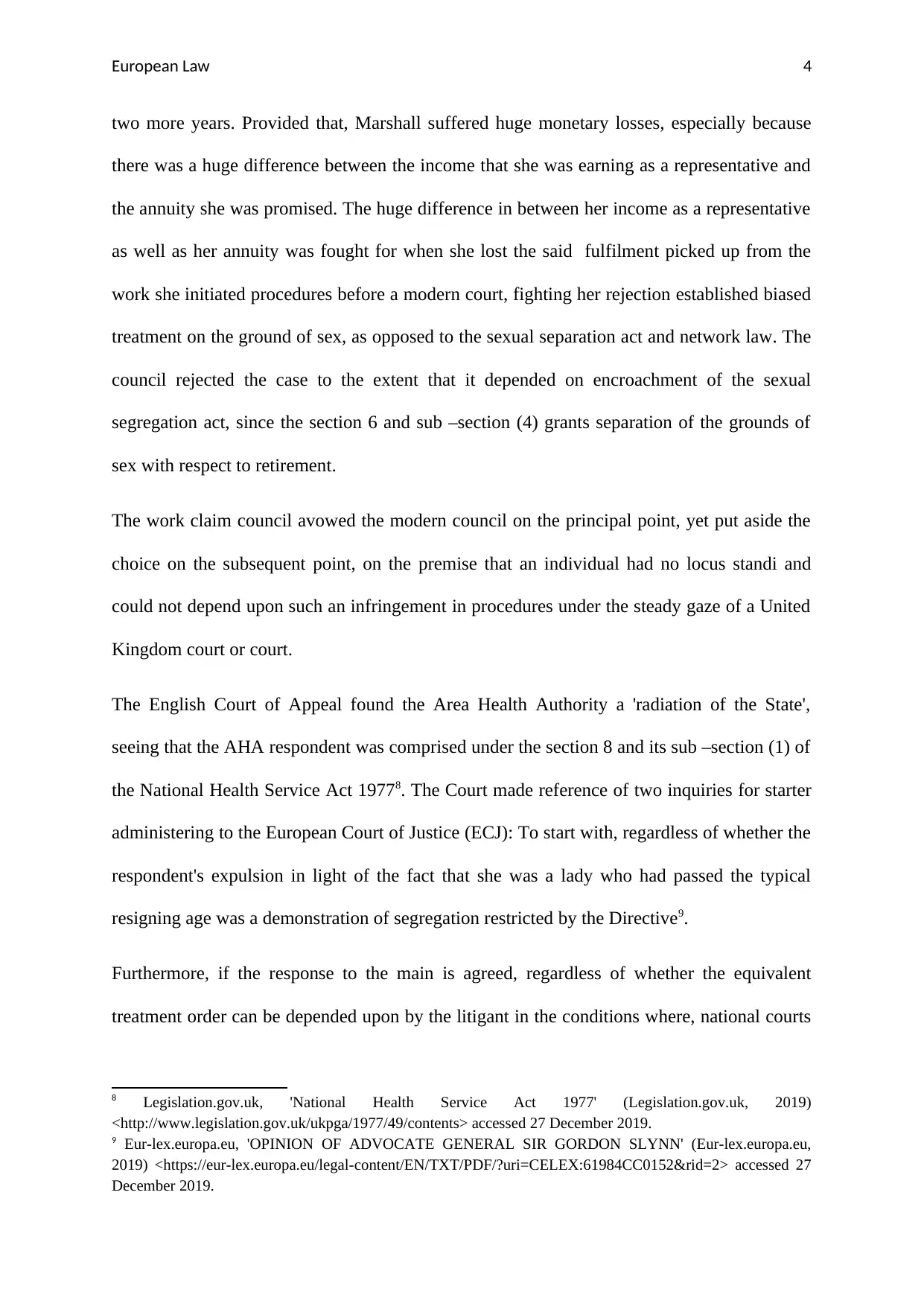
European Law 4
two more years. Provided that, Marshall suffered huge monetary losses, especially because
there was a huge difference between the income that she was earning as a representative and
the annuity she was promised. The huge difference in between her income as a representative
as well as her annuity was fought for when she lost the said fulfilment picked up from the
work she initiated procedures before a modern court, fighting her rejection established biased
treatment on the ground of sex, as opposed to the sexual separation act and network law. The
council rejected the case to the extent that it depended on encroachment of the sexual
segregation act, since the section 6 and sub –section (4) grants separation of the grounds of
sex with respect to retirement.
The work claim council avowed the modern council on the principal point, yet put aside the
choice on the subsequent point, on the premise that an individual had no locus standi and
could not depend upon such an infringement in procedures under the steady gaze of a United
Kingdom court or court.
The English Court of Appeal found the Area Health Authority a 'radiation of the State',
seeing that the AHA respondent was comprised under the section 8 and its sub –section (1) of
the National Health Service Act 19778. The Court made reference of two inquiries for starter
administering to the European Court of Justice (ECJ): To start with, regardless of whether the
respondent's expulsion in light of the fact that she was a lady who had passed the typical
resigning age was a demonstration of segregation restricted by the Directive9.
Furthermore, if the response to the main is agreed, regardless of whether the equivalent
treatment order can be depended upon by the litigant in the conditions where, national courts
8 Legislation.gov.uk, 'National Health Service Act 1977' (Legislation.gov.uk, 2019)
<http://www.legislation.gov.uk/ukpga/1977/49/contents> accessed 27 December 2019.
9 Eur-lex.europa.eu, 'OPINION OF ADVOCATE GENERAL SIR GORDON SLYNN' (Eur-lex.europa.eu,
2019) <https://eur-lex.europa.eu/legal-content/EN/TXT/PDF/?uri=CELEX:61984CC0152&rid=2> accessed 27
December 2019.
two more years. Provided that, Marshall suffered huge monetary losses, especially because
there was a huge difference between the income that she was earning as a representative and
the annuity she was promised. The huge difference in between her income as a representative
as well as her annuity was fought for when she lost the said fulfilment picked up from the
work she initiated procedures before a modern court, fighting her rejection established biased
treatment on the ground of sex, as opposed to the sexual separation act and network law. The
council rejected the case to the extent that it depended on encroachment of the sexual
segregation act, since the section 6 and sub –section (4) grants separation of the grounds of
sex with respect to retirement.
The work claim council avowed the modern council on the principal point, yet put aside the
choice on the subsequent point, on the premise that an individual had no locus standi and
could not depend upon such an infringement in procedures under the steady gaze of a United
Kingdom court or court.
The English Court of Appeal found the Area Health Authority a 'radiation of the State',
seeing that the AHA respondent was comprised under the section 8 and its sub –section (1) of
the National Health Service Act 19778. The Court made reference of two inquiries for starter
administering to the European Court of Justice (ECJ): To start with, regardless of whether the
respondent's expulsion in light of the fact that she was a lady who had passed the typical
resigning age was a demonstration of segregation restricted by the Directive9.
Furthermore, if the response to the main is agreed, regardless of whether the equivalent
treatment order can be depended upon by the litigant in the conditions where, national courts
8 Legislation.gov.uk, 'National Health Service Act 1977' (Legislation.gov.uk, 2019)
<http://www.legislation.gov.uk/ukpga/1977/49/contents> accessed 27 December 2019.
9 Eur-lex.europa.eu, 'OPINION OF ADVOCATE GENERAL SIR GORDON SLYNN' (Eur-lex.europa.eu,
2019) <https://eur-lex.europa.eu/legal-content/EN/TXT/PDF/?uri=CELEX:61984CC0152&rid=2> accessed 27
December 2019.
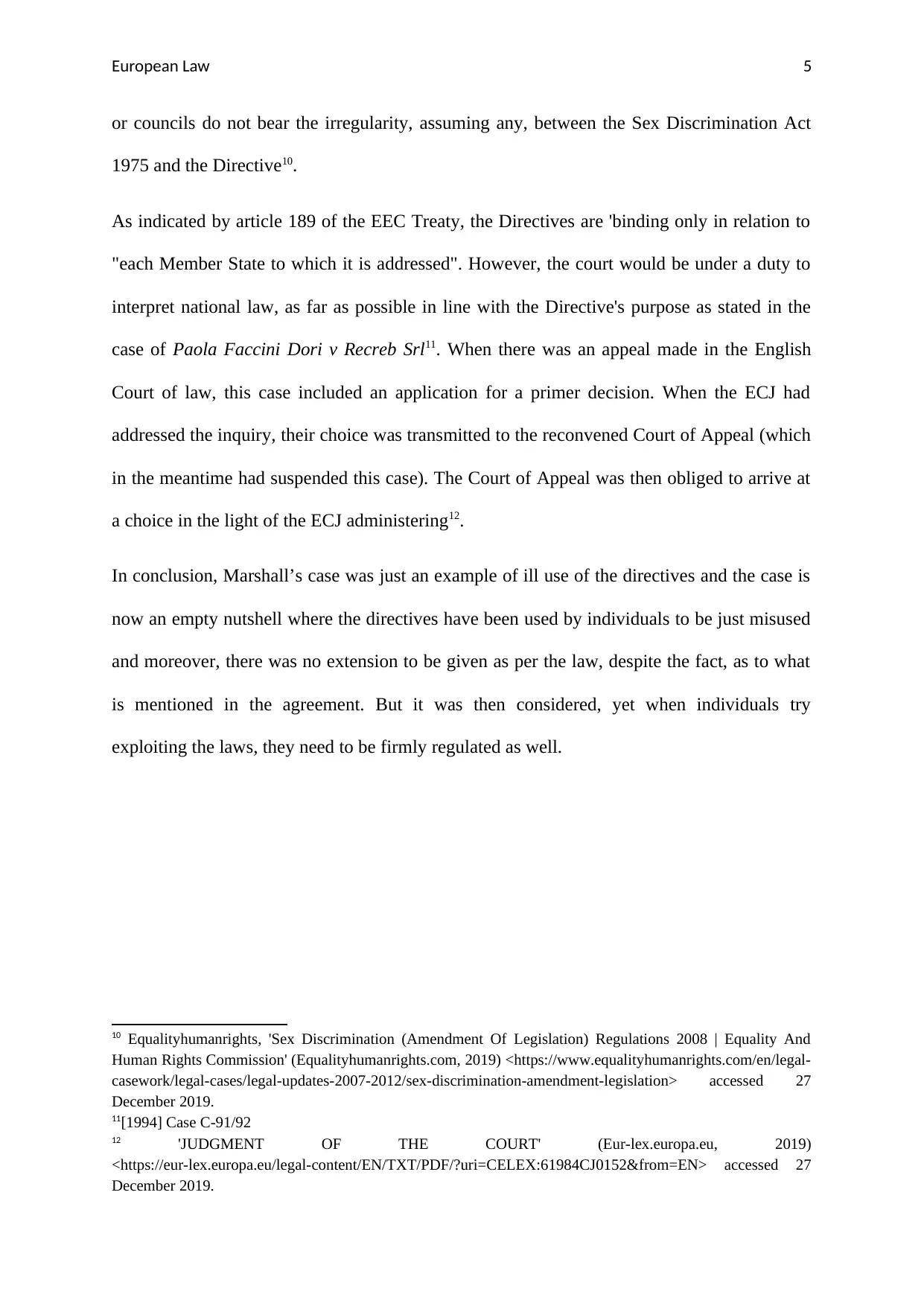
European Law 5
or councils do not bear the irregularity, assuming any, between the Sex Discrimination Act
1975 and the Directive10.
As indicated by article 189 of the EEC Treaty, the Directives are 'binding only in relation to
"each Member State to which it is addressed". However, the court would be under a duty to
interpret national law, as far as possible in line with the Directive's purpose as stated in the
case of Paola Faccini Dori v Recreb Srl11. When there was an appeal made in the English
Court of law, this case included an application for a primer decision. When the ECJ had
addressed the inquiry, their choice was transmitted to the reconvened Court of Appeal (which
in the meantime had suspended this case). The Court of Appeal was then obliged to arrive at
a choice in the light of the ECJ administering12.
In conclusion, Marshall’s case was just an example of ill use of the directives and the case is
now an empty nutshell where the directives have been used by individuals to be just misused
and moreover, there was no extension to be given as per the law, despite the fact, as to what
is mentioned in the agreement. But it was then considered, yet when individuals try
exploiting the laws, they need to be firmly regulated as well.
10 Equalityhumanrights, 'Sex Discrimination (Amendment Of Legislation) Regulations 2008 | Equality And
Human Rights Commission' (Equalityhumanrights.com, 2019) <https://www.equalityhumanrights.com/en/legal-
casework/legal-cases/legal-updates-2007-2012/sex-discrimination-amendment-legislation> accessed 27
December 2019.
11[1994] Case C-91/92
12 'JUDGMENT OF THE COURT' (Eur-lex.europa.eu, 2019)
<https://eur-lex.europa.eu/legal-content/EN/TXT/PDF/?uri=CELEX:61984CJ0152&from=EN> accessed 27
December 2019.
or councils do not bear the irregularity, assuming any, between the Sex Discrimination Act
1975 and the Directive10.
As indicated by article 189 of the EEC Treaty, the Directives are 'binding only in relation to
"each Member State to which it is addressed". However, the court would be under a duty to
interpret national law, as far as possible in line with the Directive's purpose as stated in the
case of Paola Faccini Dori v Recreb Srl11. When there was an appeal made in the English
Court of law, this case included an application for a primer decision. When the ECJ had
addressed the inquiry, their choice was transmitted to the reconvened Court of Appeal (which
in the meantime had suspended this case). The Court of Appeal was then obliged to arrive at
a choice in the light of the ECJ administering12.
In conclusion, Marshall’s case was just an example of ill use of the directives and the case is
now an empty nutshell where the directives have been used by individuals to be just misused
and moreover, there was no extension to be given as per the law, despite the fact, as to what
is mentioned in the agreement. But it was then considered, yet when individuals try
exploiting the laws, they need to be firmly regulated as well.
10 Equalityhumanrights, 'Sex Discrimination (Amendment Of Legislation) Regulations 2008 | Equality And
Human Rights Commission' (Equalityhumanrights.com, 2019) <https://www.equalityhumanrights.com/en/legal-
casework/legal-cases/legal-updates-2007-2012/sex-discrimination-amendment-legislation> accessed 27
December 2019.
11[1994] Case C-91/92
12 'JUDGMENT OF THE COURT' (Eur-lex.europa.eu, 2019)
<https://eur-lex.europa.eu/legal-content/EN/TXT/PDF/?uri=CELEX:61984CJ0152&from=EN> accessed 27
December 2019.
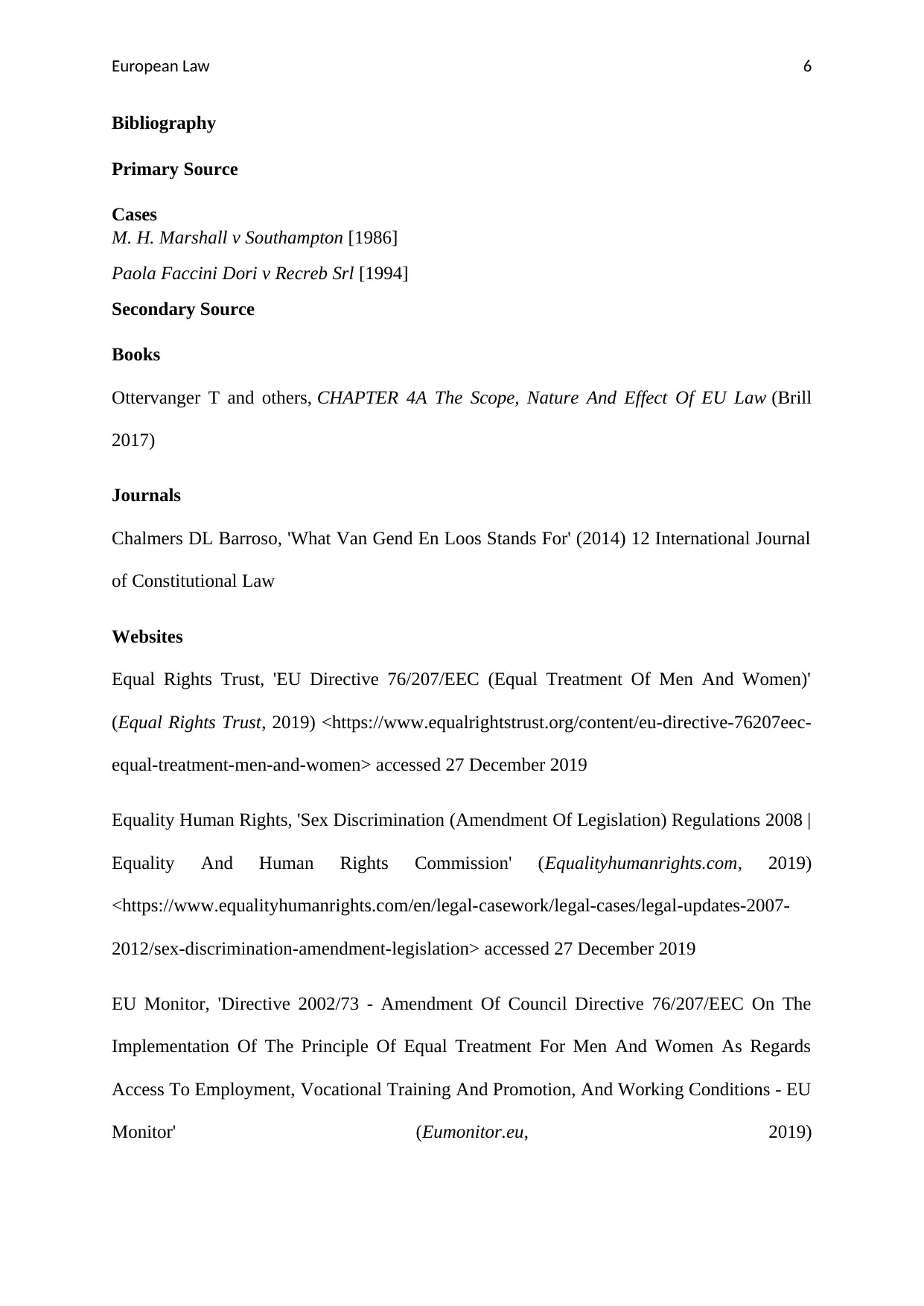
European Law 6
Bibliography
Primary Source
Cases
M. H. Marshall v Southampton [1986]
Paola Faccini Dori v Recreb Srl [1994]
Secondary Source
Books
Ottervanger T and others, CHAPTER 4A The Scope, Nature And Effect Of EU Law (Brill
2017)
Journals
Chalmers DL Barroso, 'What Van Gend En Loos Stands For' (2014) 12 International Journal
of Constitutional Law
Websites
Equal Rights Trust, 'EU Directive 76/207/EEC (Equal Treatment Of Men And Women)'
(Equal Rights Trust, 2019) <https://www.equalrightstrust.org/content/eu-directive-76207eec-
equal-treatment-men-and-women> accessed 27 December 2019
Equality Human Rights, 'Sex Discrimination (Amendment Of Legislation) Regulations 2008 |
Equality And Human Rights Commission' (Equalityhumanrights.com, 2019)
<https://www.equalityhumanrights.com/en/legal-casework/legal-cases/legal-updates-2007-
2012/sex-discrimination-amendment-legislation> accessed 27 December 2019
EU Monitor, 'Directive 2002/73 - Amendment Of Council Directive 76/207/EEC On The
Implementation Of The Principle Of Equal Treatment For Men And Women As Regards
Access To Employment, Vocational Training And Promotion, And Working Conditions - EU
Monitor' (Eumonitor.eu, 2019)
Bibliography
Primary Source
Cases
M. H. Marshall v Southampton [1986]
Paola Faccini Dori v Recreb Srl [1994]
Secondary Source
Books
Ottervanger T and others, CHAPTER 4A The Scope, Nature And Effect Of EU Law (Brill
2017)
Journals
Chalmers DL Barroso, 'What Van Gend En Loos Stands For' (2014) 12 International Journal
of Constitutional Law
Websites
Equal Rights Trust, 'EU Directive 76/207/EEC (Equal Treatment Of Men And Women)'
(Equal Rights Trust, 2019) <https://www.equalrightstrust.org/content/eu-directive-76207eec-
equal-treatment-men-and-women> accessed 27 December 2019
Equality Human Rights, 'Sex Discrimination (Amendment Of Legislation) Regulations 2008 |
Equality And Human Rights Commission' (Equalityhumanrights.com, 2019)
<https://www.equalityhumanrights.com/en/legal-casework/legal-cases/legal-updates-2007-
2012/sex-discrimination-amendment-legislation> accessed 27 December 2019
EU Monitor, 'Directive 2002/73 - Amendment Of Council Directive 76/207/EEC On The
Implementation Of The Principle Of Equal Treatment For Men And Women As Regards
Access To Employment, Vocational Training And Promotion, And Working Conditions - EU
Monitor' (Eumonitor.eu, 2019)
Paraphrase This Document
Need a fresh take? Get an instant paraphrase of this document with our AI Paraphraser
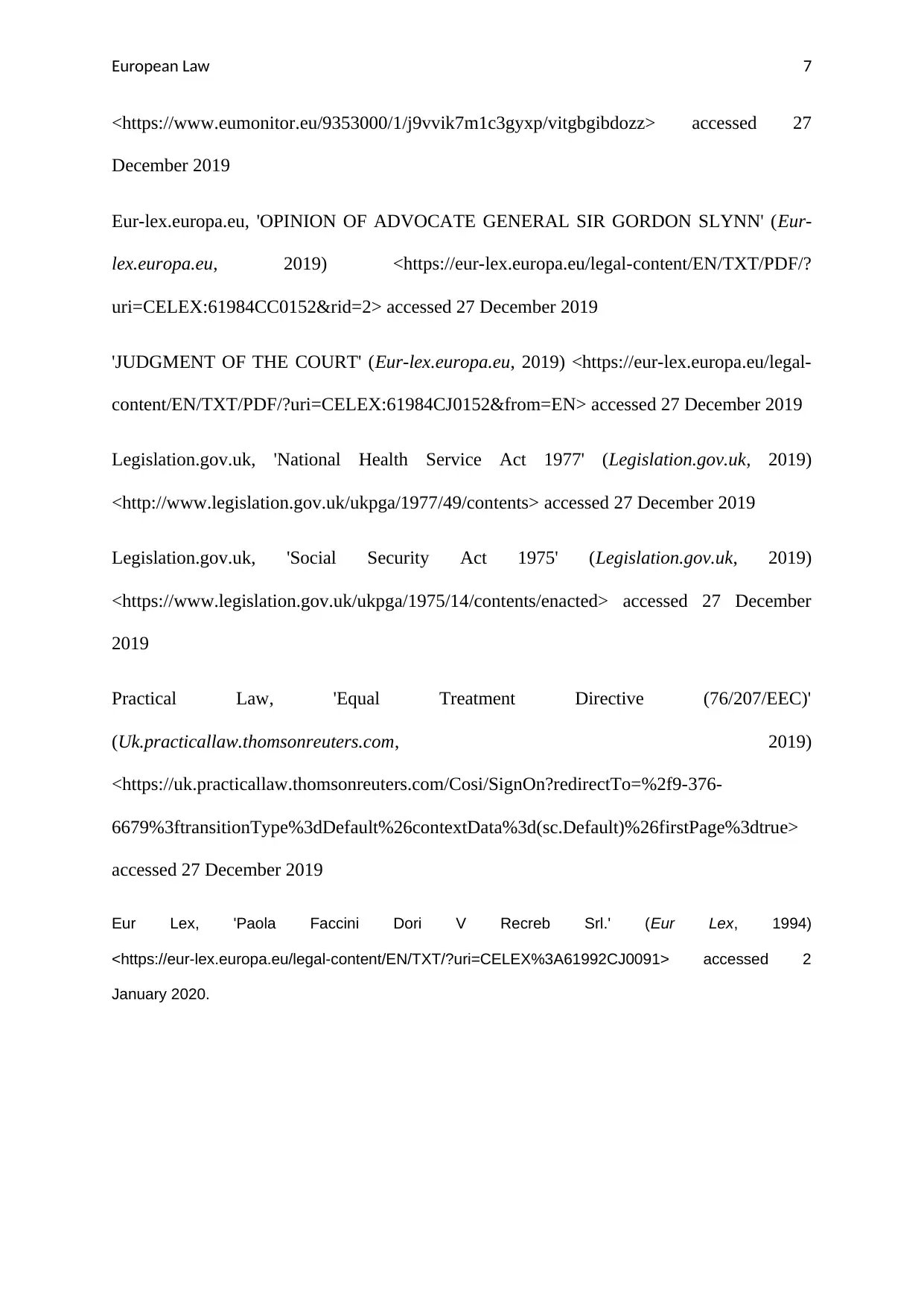
European Law 7
<https://www.eumonitor.eu/9353000/1/j9vvik7m1c3gyxp/vitgbgibdozz> accessed 27
December 2019
Eur-lex.europa.eu, 'OPINION OF ADVOCATE GENERAL SIR GORDON SLYNN' (Eur-
lex.europa.eu, 2019) <https://eur-lex.europa.eu/legal-content/EN/TXT/PDF/?
uri=CELEX:61984CC0152&rid=2> accessed 27 December 2019
'JUDGMENT OF THE COURT' (Eur-lex.europa.eu, 2019) <https://eur-lex.europa.eu/legal-
content/EN/TXT/PDF/?uri=CELEX:61984CJ0152&from=EN> accessed 27 December 2019
Legislation.gov.uk, 'National Health Service Act 1977' (Legislation.gov.uk, 2019)
<http://www.legislation.gov.uk/ukpga/1977/49/contents> accessed 27 December 2019
Legislation.gov.uk, 'Social Security Act 1975' (Legislation.gov.uk, 2019)
<https://www.legislation.gov.uk/ukpga/1975/14/contents/enacted> accessed 27 December
2019
Practical Law, 'Equal Treatment Directive (76/207/EEC)'
(Uk.practicallaw.thomsonreuters.com, 2019)
<https://uk.practicallaw.thomsonreuters.com/Cosi/SignOn?redirectTo=%2f9-376-
6679%3ftransitionType%3dDefault%26contextData%3d(sc.Default)%26firstPage%3dtrue>
accessed 27 December 2019
Eur Lex, 'Paola Faccini Dori V Recreb Srl.' (Eur Lex, 1994)
<https://eur-lex.europa.eu/legal-content/EN/TXT/?uri=CELEX%3A61992CJ0091> accessed 2
January 2020.
<https://www.eumonitor.eu/9353000/1/j9vvik7m1c3gyxp/vitgbgibdozz> accessed 27
December 2019
Eur-lex.europa.eu, 'OPINION OF ADVOCATE GENERAL SIR GORDON SLYNN' (Eur-
lex.europa.eu, 2019) <https://eur-lex.europa.eu/legal-content/EN/TXT/PDF/?
uri=CELEX:61984CC0152&rid=2> accessed 27 December 2019
'JUDGMENT OF THE COURT' (Eur-lex.europa.eu, 2019) <https://eur-lex.europa.eu/legal-
content/EN/TXT/PDF/?uri=CELEX:61984CJ0152&from=EN> accessed 27 December 2019
Legislation.gov.uk, 'National Health Service Act 1977' (Legislation.gov.uk, 2019)
<http://www.legislation.gov.uk/ukpga/1977/49/contents> accessed 27 December 2019
Legislation.gov.uk, 'Social Security Act 1975' (Legislation.gov.uk, 2019)
<https://www.legislation.gov.uk/ukpga/1975/14/contents/enacted> accessed 27 December
2019
Practical Law, 'Equal Treatment Directive (76/207/EEC)'
(Uk.practicallaw.thomsonreuters.com, 2019)
<https://uk.practicallaw.thomsonreuters.com/Cosi/SignOn?redirectTo=%2f9-376-
6679%3ftransitionType%3dDefault%26contextData%3d(sc.Default)%26firstPage%3dtrue>
accessed 27 December 2019
Eur Lex, 'Paola Faccini Dori V Recreb Srl.' (Eur Lex, 1994)
<https://eur-lex.europa.eu/legal-content/EN/TXT/?uri=CELEX%3A61992CJ0091> accessed 2
January 2020.
1 out of 8
Related Documents
Your All-in-One AI-Powered Toolkit for Academic Success.
+13062052269
info@desklib.com
Available 24*7 on WhatsApp / Email
![[object Object]](/_next/static/media/star-bottom.7253800d.svg)
Unlock your academic potential
© 2024 | Zucol Services PVT LTD | All rights reserved.





